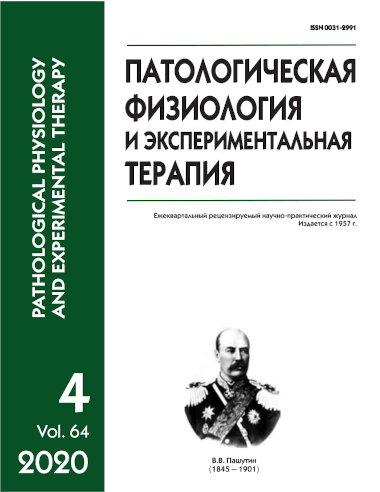Influence of lithium chloride on neutrophil activation in the development of systemic inflammatory response syndrome in patients after on-pump cardiac surgery
Abstract
The aim of this work was to study the anti-inflammatory effect of lithium chloride on human neutrophils in vitro under the action of the serum of patients with systemic inflammatory response syndrome (SIRS), which developed after on-pump cardiac surgery. Methods. The study was performed on neutrophils isolated from the blood of five healthy donors, which was activated using serum from patients with SIRS. Neutrophil activity was assessed using fluorescent antibodies to CD11b and CD66b degranulation markers. The level of apoptosis and necrosis of human neutrophils was evaluated 22 hours after isolation. Quantification was performed using annexin V and propidium iodide on a flow cytometer. Intact and activated neutrophils were treated with 0.3, 3.0 аnd 9.0 mM lithium chlorides. Results. Incubation of neutrophils with the blood serum of patients with SIRS after on-pump cardiac surgery increased the expression of CD11b by 1.5 times and the expression of CD66b by 1.4 times compared to expression on intact neutrophils. Incubation of neutrophils with blood serum of patients with SIRS and 3.0 and 9.0 mM lithium chloride solutions led to a statistically significant decrease in the level of expression of CD11b CD66b on the surface of neutrophils in comparison with control activated neutrophils. It was found that 3.0 and 9.0 mM lithium chloride solutions returned the expression levels of CD11b and CD66b on activated neutrophils to the expression level on intact neutrophils. 0.3 mM of lithium chloride, used during incubation with activated neutrophils, did not cause a significant decrease in the expression of CD11b and CD66b relative to control activated neutrophils. The expression of CD11b and CD66b on activated neutrophils during their incubation with 0.3 mM of lithium chloride was significantly higher relative to the expression of these molecules on intact neutrophils. The serum of patients with advanced SIRS decreased the ability of neutrophils to spontaneous apoptosis. 3.0 or 9.0 mM lithium chloride solutions added to the incubation medium increased the ability of neutrophils to spontaneous apoptosis. Conclusion. Lithium chloride reduced the degranulation and activation of neutrophils by reducing the expression level of CD11b and CD66b molecules on the surface of neutrophils that were previously activated by the serum of patients with SIRS. This effect determines the anti-inflammatory influence of lithium chloride. Lithium chloride at 3.0 mM and higher induced spontaneous apoptosis of neutrophils activated by the serum of patients with SIRS after on-pump cardiac surgery.






